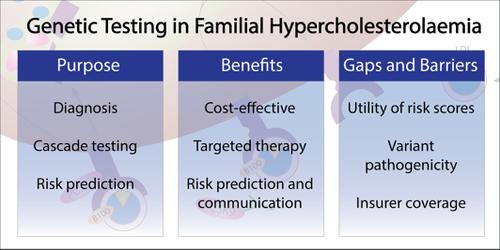当前位置:
X-MOL 学术
›
Clin. Genet.
›
论文详情
Our official English website, www.x-mol.net, welcomes your
feedback! (Note: you will need to create a separate account there.)
Widening the spectrum of genetic testing in familial hypercholesterolaemia: Will it translate into better patient and population outcomes?
Clinical Genetics ( IF 2.9 ) Pub Date : 2019-12-27 , DOI: 10.1111/cge.13685 Michael M Page 1, 2 , Damon A Bell 1, 3, 4, 5 , Gerald F Watts 1, 4
Clinical Genetics ( IF 2.9 ) Pub Date : 2019-12-27 , DOI: 10.1111/cge.13685 Michael M Page 1, 2 , Damon A Bell 1, 3, 4, 5 , Gerald F Watts 1, 4
Affiliation

|
Familial hypercholesterolaemia (FH) is caused by pathogenic variants in LDLR, APOB or PCSK9. Impaired low‐density lipoprotein (LDL) receptor function leads to decreased LDL catabolism and premature atherosclerotic cardiovascular disease (ASCVD). Thousands of LDLR variants are known, but assignation of pathogenicity requires accurate phenotyping, family studies and assessment of LDL receptor function. Precise, genetic diagnosis of FH using targeted next generation sequencing allows for optimal treatment, distinguishing FH from pathogenically distinct disorders requiring different treatment. Polygenic hypercholesterolaemia resulting from an accumulation of LDL cholesterol‐raising single nucleotide polymorphisms (SNPs) could also be suspected by this approach. Similarly, ASCVD risk could be estimated by broader sequencing of cholesterol and non‐cholesterol‐related genes. Both of these areas require further research. The clinical management of FH, focusing on the primary or secondary prevention of ASCVD, has been boosted by PCSK9 inhibitor therapy. The efficacy of PCSK9 inhibitors in homozygous FH may be partly predicted by the LDLR variants. While expanded genetic testing in FH is clinically useful in providing an accurate diagnosis and enabling cost‐effective testing of relatives, further research is needed to establish its value in improving clinical outcomes.
中文翻译:

家族性高胆固醇血症的基因检测范围扩大:它将转化为更好的患者和人群结果吗?
家族性高胆固醇血症(FH)由LDLR,APOB或PCSK9中的致病性变异引起。低密度脂蛋白(LDL)受体功能受损会导致LDL分解代谢降低和过早的动脉粥样硬化性心血管疾病(ASCVD)。数以千计的LDLR变体是已知的,但是致病性的分配需要准确的表型,家族研究和LDL受体功能的评估。使用靶向的下一代测序技术对FH进行精确的遗传诊断可实现最佳治疗,从而将FH与需要不同治疗的病原性疾病区分开来。这种方法也可能怀疑由LDL胆固醇升高的单核苷酸多态性(SNP)积累引起的多基因高胆固醇血症。同样,可以通过对胆固醇和非胆固醇相关基因进行更广泛的测序来估计ASCVD风险。这两个领域都需要进一步研究。PCSK9抑制剂疗法促进了FH的临床管理,重点是ASCVD的一级或二级预防。LDLR变体。虽然在FH中进行扩展的基因检测在临床上可用于提供准确的诊断并进行具有成本效益的亲属检测,但仍需要进一步研究以确立其在改善临床结果中的价值。
更新日期:2020-03-26
中文翻译:

家族性高胆固醇血症的基因检测范围扩大:它将转化为更好的患者和人群结果吗?
家族性高胆固醇血症(FH)由LDLR,APOB或PCSK9中的致病性变异引起。低密度脂蛋白(LDL)受体功能受损会导致LDL分解代谢降低和过早的动脉粥样硬化性心血管疾病(ASCVD)。数以千计的LDLR变体是已知的,但是致病性的分配需要准确的表型,家族研究和LDL受体功能的评估。使用靶向的下一代测序技术对FH进行精确的遗传诊断可实现最佳治疗,从而将FH与需要不同治疗的病原性疾病区分开来。这种方法也可能怀疑由LDL胆固醇升高的单核苷酸多态性(SNP)积累引起的多基因高胆固醇血症。同样,可以通过对胆固醇和非胆固醇相关基因进行更广泛的测序来估计ASCVD风险。这两个领域都需要进一步研究。PCSK9抑制剂疗法促进了FH的临床管理,重点是ASCVD的一级或二级预防。LDLR变体。虽然在FH中进行扩展的基因检测在临床上可用于提供准确的诊断并进行具有成本效益的亲属检测,但仍需要进一步研究以确立其在改善临床结果中的价值。











































 京公网安备 11010802027423号
京公网安备 11010802027423号